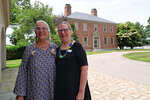

I've cooked in many kitchens through the years, from commercial kitchens to high-tech, marble-countered contemporary ones. And to me, a kitchen with a Sub-Zero fridge is no better than one without electricity or running water. Kitchens are places where love and nurturing are the main ingredients, and they should be designed to meet the needs of the cooks and families who live in them and the food they create.
The first real maternal love that I received was from my Noni, my Italian grandmother, and “grandmommy,” my Mississippi grandmother. My mother, a single woman, left our house in East Boston at six in the morning to get to work at Sylvania in Woburn. The early departure enabled her to pick up four passengers, also coworkers. Returning home at around six in the evening did not allow much time to prepare supper. That was mostly my job. "Peel the potatoes, slice the tomatoes, grate the cheese, make a salad, set the table," were just a few of the orders she left me on a Monday to Friday basis. Weekends were her turn, although she had it pretty easy, as I recall, especially Saturday night, when she opened a can of baked beans, a can of brown bread, and boiled some hot dogs.
Sunday meal was my favorite, however. Like every Italian family on our block, before church, a pot of tomato sauce containing meatballs, sausages, and various chunks of meat simmered on our stove for a few hours. At two in the afternoon, my brother, my mother and I had our Sunday meal, and it was delicious. I remember loving my mother with her pretty apron in the kitchen, my brother at the table doing his homework. He was the student in the family. Boston Latin, the school he attended, demanded lots of homework. After our meal, we would play cards. Sometimes we would take a ride to Revere and visit Noni and Nono, picking up some cannoli at a bakery on the way.
When we were preschool age, my Noni took care of my brother and I so my mother could go off to work. In the summer, Noni set up her kitchen in the basement because it was much cooler. We spent time in their garden gathering vegetables for dinner. Their neighbor offered a huge piece of land where they could plant their garden, in exchange they would provide him with the fruits of their labor. Every day, Noni created something delicious with the zucchini, the peppers, onions, eggplant, string beans, tomatoes, corn. It was magical to me that she could always make something different with the same vegetables. A minestrone, a pasta dish, a casserole — they were always so delicious. I helped with the cooking, but the canning during the fall was the most exciting time.
I still remember her shelves in the basement lined with all the jars of food from the garden being the most beautiful sight I recall from my childhood. And spending time in her kitchen with the wood-burning stove in the summer, with pots simmering with luscious vegetables, the aroma permeating the intimate space, and Noni always in her apron.
My mother's second husband was from Mississippi. They met at the Navy Yard where my mother worked for a few years. When I was about eight years old and my brother about five, we took a long trip by car to visit our stepfather's mother in Crystal Springs, Mississippi. My stepfather was in the Navy and took a leave of about a month from his ship. Grandmommy owned a huge plantation with many animals; cows, pigs, horses, goats, chickens and huge plantings of tobacco, cotton, vegetables, watermelon and pecan, peach and fig trees. The property had no running water, no electricity, no bathrooms.
There was a shack in the middle of the land where about twenty "hands" lived in one room. They helped with all the chores. In the early morning, after the rooster crowed, we went to the well for water. Breakfast in grandmommy's kitchen consisted of biscuits, grits, bacon, eggs, her delicious jams made from the various fruits grown on the property. After breakfast, we went to the chicken coop to gather more eggs, and grandmommy killed a few chickens, which horrified my brother and I, watching her ring the necks. We went to the barn and watched and learned how to milk the cows. In the afternoon, we sometimes would help to hitch up a mule-driven wagon for a trip to town where we would sell watermelons at the train station. Sometimes there would be a barn dance in the evening at the station, and that was fun.
A few weeks into this routine, our visit was coming to an end. My mother asked me if I would like to stay for another month or so, until school started, and without hesitation I consented. I was in heaven. My brother and I were sad to leave each other, but I couldn't wait to have time with my grandmommy. She taught me to make cobblers, to pickle peaches and watermelon rind, to churn butter and make biscuits with the buttermilk. We gardened and cooked. She made me adorable little sundresses from the flowered seed sacks. She gave me a room in the barn where I set up my dolls, a gift from the neighbors, "down yonder.” On our first Sunday together, she brought me to her Baptist Church. On our second Sunday, she had me baptized in this huge pool of holy water and later we celebrated "my baptism" in the church basement with fried chicken and peach cobbler. The next summer I gave up my usual camp experience and went to Mississippi, by train, by myself, and spent one of the best times of my life with grandmommy.